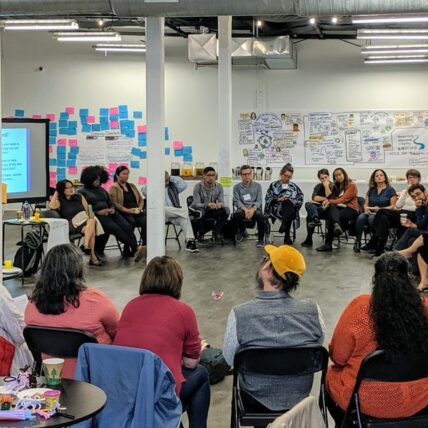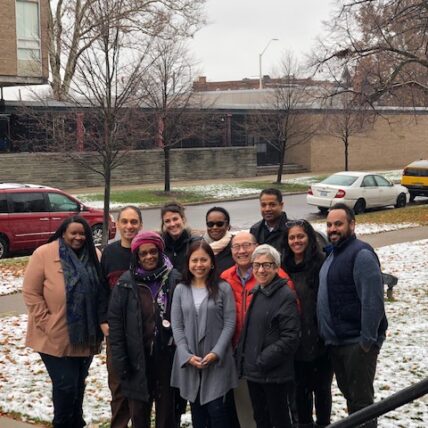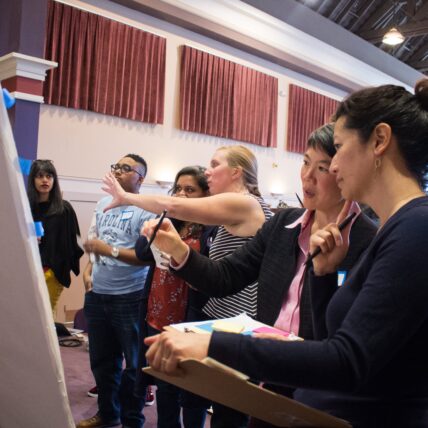Influencing Complex Systems Change

Influencing Complex Systems Change
 Photo credit: Cory Doctorow | CC BY-SA 2.0Photo credit: Cory Doctorow | CC BY-SA 2.0Systems change is the process of shifting narratives, relationships, structures, and power in order to solve today’s most complex problems and foster equity.
Photo credit: Cory Doctorow | CC BY-SA 2.0Photo credit: Cory Doctorow | CC BY-SA 2.0Systems change is the process of shifting narratives, relationships, structures, and power in order to solve today’s most complex problems and foster equity.
This includes shifting resources, values, mindsets, infrastructure, policies, processes, and more. These efforts aim to change both the system’s parts and the relationships between the parts, with the understanding that this change will have ripple effects inside and outside the system.
A systems approach requires stepping back to understand and map out the interconnected web of historic conditions and current emerging patterns that connect structures, cultures, institutions, and individuals influencing the system; rethinking systems boundaries to address intersecting factors; and centering equity and multiple ways of knowing.
At Change Elemental, we see that, despite increased attention towards systems change efforts that address root causes, many of these efforts have failed to adequately acknowledge the historic and present conditions, structures, and practices that maintain and exacerbate inequity.
Ashley Shelton of Power Coalition, and a Change Elemental governance team member, has been engaged in New Orleans recovery since Hurricane Katrina and the levee break in 2005. That recovery process did not inherently put equity at its center. She has shared, “As programs were built and dollars given to agencies, for us, equity was about trying to put an emphasis on justice and fairness.” For example, after people were displaced for months, the first communication they received was planning maps created by the Bring New Orleans Back Commission. “The Lower Ninth Ward? People saw it coming [back on the map] as a park. We said, a small handful of people don’t get to decide how the city returns. We created voice and pressure. […] This is where equity made a difference.” New maps were developed with more equitable outcomes for community residents by including them in the process. The voice and pressure created are still informing the comprehensive zoning process more than ten years later. For more on this story, please refer to our article, Influencing Complex Systems Change, in the Nonprofit Quarterly.
True systems change efforts do not merely change inequitable structures, but strive to transform the underlying power dynamics, narratives, and histories that built these structures and enable them to thrive. An equity lens is essential to systems change efforts to avoid change efforts that reinstitute the status quo, or replace one set of systemic inequities with another.
Pathways for transformation that do not embrace equity and intersectionality across issues and movements will continue to be unsuccessful, and will reinforce the current challenges.
We are seeing some emerging practices for deepening and centering equity in complex systems change:
- Trust that those most impacted can define the problems and potential solutions; make the space and resources available for them to do so.
- Seek, share, and magnify stories that convey both the fullness of the present, and the histories that led us here.
- In defining problems and solutions, consider the seven generations of factors contributing to this moment, and the seven generations yet to come.
- Challenge and reimagine the practices and approaches that have become social sector norms that limit what is possible.
Systems Change in Action
This Sanctuary Series
This Sanctuary Series amplifies emerging and fresh voices in systems change and women-identified leadership at this moment in history. Weaving together a feminist intersectional, Indigenous, and systems worldview, their intention is to expand the realm of the possible.
Learn More
Co-creators Influencing Complex Systems Change
So many of our partners are advancing systems change to solve today’s most complex problems. Here we name just a few that inspire us to learn and deepen our practices.
Building Movement Project
The Building Movement Project develops research, tools, training materials, and opportunities for partnership that bolster nonprofit organizations’ ability to support the voice and power of the people they serve.Social Transformation Project & The Northstar Network
The NorthStar Network is a network of progressive leaders from across different movements who work toward building long-term power together. Their work includes visioning, strategizing, experimenting, and muscle-building, grounded in rigor and inspired by radical hope.
Racial Equity Tools
Racial Equity Tools website offers tools, research, tips, curricula, and ideas for people to increase their understanding and to help those working for racial justice at every level, using language and analysis reflecting an understanding of systemic racism, power, and privilege and are accessible on-line and free to users.











